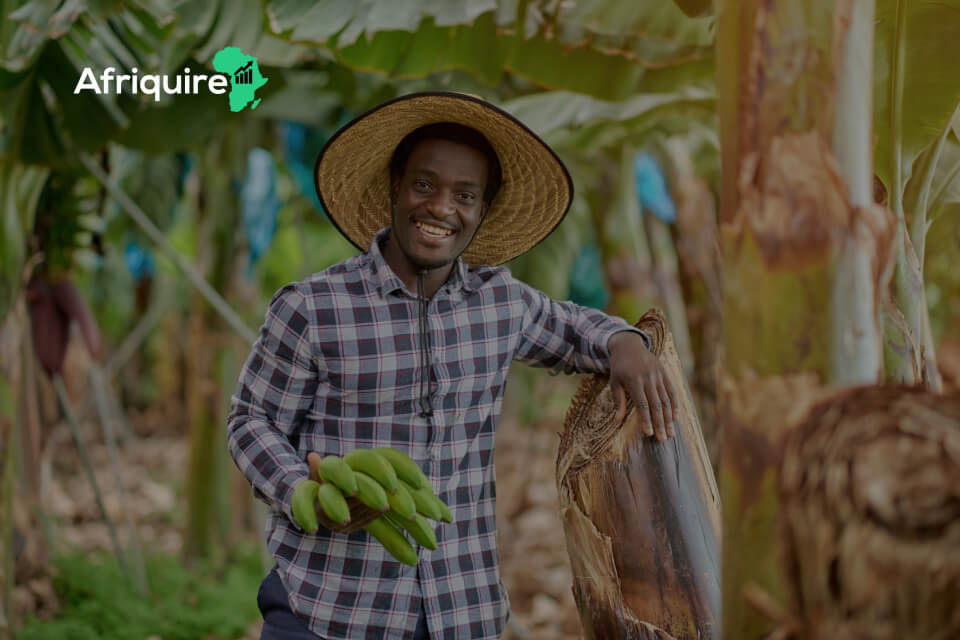Introduction
How can agripreneurs turn farming activities into profitable businesses? How do African agri-entrepreneurs learn to access the marketplace? Most agripreneurs face numerous barriers to entry, including a lack of information, inadequate infrastructure, and intense competition. They are not well-equipped to know how to access markets for African agripreneurs.
This article looks to explore the following:
- Accessing potential (local and international) markets.
- Strategies to employ for better outreach.
- Strong networks and partnerships.
Equipped with the right strategies, African agri-entrepreneurs can secure buyers, scale up their businesses, and make a tangible difference. Let’s explore and discover opportunities together!
Overview of Market Access Challenges for African Agripreneurs.
African agripreneurs encounter various barriers when attempting to market their goods. Some of these challenges include:
- Bad Roads and Poor Infrastructure: Many rural areas don’t have good roads, making it hard to transport farm produce to cities or markets.
- High Transport Costs: Because of poor infrastructure, moving goods becomes expensive, reducing the profit farmers make.
- Lack of Market Information: Farmers often don’t know what buyers want or how much their products are worth, so they miss out on good opportunities.
- Limited Funding: Many agripreneurs struggle to get loans or money to grow their businesses and meet market demands.
- Strict Export Rules: Some markets, especially international ones, require high-quality products and proper certification, which can be tough for small farmers to meet.
- Digital Divide: Online platforms can help agripreneurs sell more products, but many farmers don’t have access to the internet or don’t know how to use these tools.
These are the challenges that must be addressed in order to empower the agripreneurs for better competitiveness in both local and international markets.
Importance of Market Access in Driving Agribusiness Growth and Sustainability.
Better market access can help agripreneurs succeed and make farming sustainable. Here’s how:
- Increased Income: Farmers can sell their produce at better prices when they have access to a broader range of buyers.
- Economic Growth: When agripreneurs generate more income, they contribute to local economies by creating jobs and supporting other businesses.
- Diverse Products: Access to different markets encourages farmers to grow a variety of crops, which reduces risks associated with price fluctuations in a single product.
- Encourages Innovation: Agripreneurs who sell to different markets learn about new consumer needs and create better or new products to meet those demands.
- Stronger Value Chains: By collaborating with processors and retailers, farmers have increased opportunities to sell their goods and secure a steady income.
The key to transforming agriculture into an economic growth driver for the whole continent relies on agripreneurs learning how to access markets that benefit both sustainable farming and consumers.

Identifying and Evaluating Potential Markets
One of the significant issues faced by agripreneurs in Africa is identifying the right markets for their products. Another mistake that African startups should avoid is failing to evaluate and select potential consumers properly. Knowing what people want to buy and where to sell it can increase your business. But how do you determine this? Let’s discuss how to conduct market research, identify potential markets, and assess whether they are suitable for your business.
Market Research: Understanding Demand and Consumer Preferences.
Market research is all about the needs and purchase decisions of people. The agripreneur needs to produce products that customers prefer. One way to achieve this is through the use of surveys. You could ask people about the food choices they make, their favourite products, or the prices they are willing to pay for such products. This type of information will help in making better decisions.
Another method is through focus groups, where a small group of people can share their opinions and perspectives. You can also use Google Analytics to see what people are searching online for. For instance, if you notice a significant interest in organic fruits, you will focus on the production of those. Knowing what people want helps not only in creating the right products but also in advertising them. Local production can be promoted simply by its name, as people often prefer locally made foods.
Tools and Strategies for Market Identification
After a thorough market research, the next step will be to find the best market for your product. The useful method in this regard is data analytics. By observing the numbers and trends, you can find out which place has more buyers and consumers.
You can also conduct market surveys to get information directly from people. Social media is another excellent tool where many people share their opinions online, and by watching what they say, you can spot new trends.
Other means include a SWOT analysis. Finding your business’s Strengths, Weaknesses, Opportunities, and Threats. For example, when your strength is in the cultivation of exclusive vegetables, then you may concentrate your efforts in places that need them. All these tools and strategies help in selecting the most suitable place for selling your products and reaching a relevant target audience.
Evaluating Market Size, Competition, and Profitability.
After identifying markets, you must verify whether they are worth pursuing. Start with market size. How many people are willing to buy your products? More significant markets mean more chances to sell.
Next, pay attention to competition. If many people sell similar products, try to figure out what would make you stand out from them. You’ll need to closely monitor your competitors’ activities and strategies to stay ahead of them.
Finally, check the profitability. Compare the cost of producing and marketing your products against the potential earnings. If the margins are too small, it may not be worth choosing that market.
By considering all these factors carefully, an agripreneur would make informed decisions on how to start an agribusiness and where to concentrate efforts. It would significantly contribute to the growth and success of any business in the agricultural sector.
How to Meet Market Requirements and Standards
For African agripreneurs seeking to access competitive markets, meeting market requirements and standards is crucial. Understanding and adhering to quality standards help the agripreneur demonstrate that their produce is safe and of high quality, meeting the customer’s expectations. This opens up a wide avenue for both local and international markets, as well as enhancing consumer trust, making it easier to grow businesses.
Importance of Compliance with Quality Standards and Certifications.
To most agripreneurs, standards and certification are the tickets to larger markets. In that regard, some global standards, such as GLOBALG.A.P., emphasise sustainable food production. Most buyers in target markets, such as Europe and North America, prefer GLOBAL GAP-certified produce, as they pay close attention to safe and environmentally clean food.
When agripreneurs are in a position to achieve this, they stand out. Buyers also find them dependable, which may translate into more sales from return customers. Additionally, most major retailers ensure that suppliers are certified to prevent the sale of substandard products. It is, therefore, crucial that learning to access markets for African agripreneurs begins by prioritizing quality standards and certifications.
Strategies for Meeting Packaging, Labeling, and Safety Requirements.
Packaging, labeling, and safety are general requirements that any agripreneur must meet to succeed in any market. First is good packaging. Packaging should not only be attractive but also protective and in conformance with local regulations. Using materials that will keep your product fresh and are environmentally friendly is a wise choice.
Labelling is just as important. Labels should contain all relevant information, including ingredients, nutritional value, and expiration dates. Using digital tools, agripreneurs can design labels that meet international standards yet are attractive to customers. Safety is another crucial aspect. The agripreneur must ensure that proper hygiene practices are observed during the production and handling of the produce.
Training workers on food safety protocols and regularly checking the facilities for cleanliness will help deter any contamination. These strategies will facilitate meeting market requirements and, consequently, make the products more competitive.
Role of Training and Capacity Building in Achieving Compliance.
Training and capacity building are essential in enabling agripreneurs to meet the market requirements. Most agripreneurs may not be familiar with the rules or best practices of farming and selling their products. This is where training programs can be beneficial.
Workshops on quality management systems, for example, guide the agripreneur through the necessary steps to ensure the business is ready for certification. Agribusiness capacity building can also focus on key areas such as sustainable farming, effective marketing, and money management.
Agricultural extension services and non-governmental organizations (NGOs) can help by providing specialized training programs. Such groups focus on the issues that agri-entrepreneurs face in their local regions and propose solutions. Agri-entrepreneurs receive instruction on how to best access markets and comply with rules.
The African agripreneur will gain access to markets through adherence to market standards, proper product packaging, and ongoing skill development training. Agripreneurs can achieve these areas of focus to drive local and global market success while establishing more substantial and sustainable enterprises.

The Role of Export Markets in African Agribusiness
One of the key ingredients of developing a successful African agripreneur is access to international markets. Understanding how to access overseas markets, identify export opportunities, and stay informed about trade regulations will help the farmer take their agribusiness to the next level.
Benefits of Targeting International Markets.
Exporting is an excellent way for agripreneurs to sell their products to more customers outside their local communities. This means more sales and better profits. Imagine if a farmer in Nigeria grows organic vegetables. Selling only within the country limits their income, but exporting those vegetables to countries that value organic food allows them to earn much more.
Exporting also stabilizes business. For instance, if demand in one country slows down, agripreneurs can rely on other markets. The balance will make their businesses solid and less risky.
Key Export Opportunities for African Agribusinesses.
There are big export chances for agripreneurs to export products. They include:
- Fresh Fruits and Vegetables: Many African countries cultivate tropical fruits such as mangoes and avocados, which are in high demand worldwide. These products can do very well in export markets.
- Processed Foods: Adding value to raw materials into products such as dried fruits or tomato paste appeals to international buyers.
- Organic Products: Global interest in organic food is growing fast. The adoption of organic farming practices enables African agripreneurs to access premium markets that are willing to pay a premium.
Understanding Trade Regulations and Leveraging Trade Agreements
To export successfully, agripreneurs need to play by the rules of trade. This means ensuring their products meet international standards for quality, packaging, and labelling.
Trade agreements like the AfCFTA make it easier for African agripreneurs to sell products across borders without heavy taxes. Similarly, the AGOA allows African goods to enter the U.S. market duty-free, opening even more significant opportunities such as the AfCFTA, making it easier for African agripreneurs to sell products across borders without incurring
Building Partnerships and Alliances for Market Access
One of the most effective ways for African agripreneurs to scale up and break into new markets is to form partnerships and alliances. Through collaboration with other agents operating within the same agricultural chain, they can share resources, enhance their efficiencies, and achieve success at a faster rate. Let’s see the importance of strategic partnership development and collaboration with relevant stakeholders.
The Importance of Strategic Partnerships in Expanding Market
Agripreneurs find strategic partnerships particularly very important as they facilitate market access. An agripreneur, in collaboration with other businesses or organizations, can share ideas, tools, and networks. It becomes possible for these farmers to access new customers for their produce.
A small farmer can collaborate with a local processing firm. This collaboration would give the farmer access to someone who will help sell his produce on a regular basis. In contrast, the processor receives fresh commodities to process into high-value products. In return, they make more money together.
The partnership helps spread out risks. Farming and agribusiness can be uncertain due to unfavourable weather or changes in market prices. When one has other business partners, the burden is divided, and the responsibility becomes more effortless to shoulder as one builds their venture without much stress.
Collaborating with Value Chain Stakeholders
Agripreneurs can also gain market access by collaborating closely with key stakeholders in the value chain. These are the people and businesses that help get the farm products from the field to the customer. They are farmers, cooperatives, processors, distributors, and retailers.
For instance, farmers can organize themselves into cooperatives, pooling their resources to purchase equipment or seeds in bulk. This will help them save some money for other essential things and enable them to produce more. Distributors also play an important role because they have access to the markets, shops, or supermarkets where customers are waiting. Strong relationships with these stakeholders ensure that agripreneurs’ products are always available to buyers.
Examples of Successful Agribusiness Alliances in Africa.
There are many examples of how partnerships are helping African agripreneurs grow.
A great example is the African Cashew Alliance, a partnership that brings together cashew farmers and processors. Through this partnership, farmers enhance their crop yields and sell to international buyers.
Other examples include TechnoServe, an organization supporting small farmers in Africa. They teach farmers how to produce better crops and connect them with large buyers in need of high-quality produce. Such opportunities have enabled many farmers to earn more and expand their businesses.
Partnerships and alliances among African agripreneurs can help address the challenges of accessing larger markets and building viable businesses. Understanding how African agripreneurs can access markets through these techniques can make a significant difference.

Overcoming Barriers to Market Entry
Overcoming barriers to market entry is crucial for African agripreneurs seeking to sell their products successfully. Many face challenges such as poor roads, a lack of funding, and limited access to information. However, with innovative strategies, these obstacles can be tackled. Let’s explore how agripreneurs can address infrastructure issues, use technology, and secure funding to access markets effectively.
Addressing Infrastructure Challenges.
One of the most significant barriers for agripreneurs is poor infrastructure. This includes problems with transportation, storage, and logistics. If roads are poor or there aren’t enough trucks to transport goods, it can be challenging for farmers to reach the market.
To solve this, agripreneurs can form cooperatives where they team up with other farmers to share resources, such as transportation and storage. They can also work with local governments and organisations to demand better roads or build community storage centres. When everyone works together, it becomes easier to move products and ensure they arrive fresh and on time.
Leveraging Technology to Bridge Information and Access Gaps.
Technology can be a powerful tool for agripreneurs. Many farmers are unaware of the current market prices or what their customers want. Mobile apps and online platforms can provide this information in real time.
For instance, apps can update farmers about prices in different markets so they don’t sell their products too cheaply. Social media is another excellent option. Agripreneurs can use platforms like Facebook or Instagram to find buyers directly for their earnings.
Technology can also aid in transportation and logistics. Some platforms allow farmers to book trucks or plan their supply chains more effectively. By embracing these tools, agripreneurs can overcome access and information barriers, making their businesses more competitive.
Securing Funding and Financial Support for Market Entry.
Funding is often a big challenge for agripreneurs. Many individuals lack access to loans because they either lack collateral or have a limited credit history. However, options like microfinance institutions and grants are available.
Microfinance offers small, low-interest loans for farmers, while grants from the government or NGOs provide free money for improving farms or expanding businesses. Agripreneurs can also partner with investors who are willing to fund their ideas in exchange for a share of the profits.
In conclusion, learning how to access markets for African agripreneurs involves improving infrastructure, using technology, and finding financial support. By facing these challenges, agripreneurs can grow their businesses and succeed in the agricultural market.
Frequently Asked Questions (FAQs)
1. Why is market access necessary for African agripreneurs?
Market access is essential as it enables the agripreneurs to sell their produce. The more buyers they can reach, the more money they make, thereby expanding their businesses. In this way, food security in Africa is improved.
2. Where can buyers be found for agricultural products?
You can find buyers by joining local farmers’ markets, using social media to promote your products, or by reaching out to restaurants and grocery stores in your community that may be interested in purchasing fresh produce.
3. What is the role of cooperatives in accessing markets?
Cooperatives can be in the form of farmer groups. They can help the agripreneurs get value for their products by bulk-buying and selling, thereby reducing costs associated with transportation and marketing.
4. Can government policies support agripreneurs in market access?
Yes, the government can support agripreneurs by providing subsidies, improving infrastructure, offering training programs, and creating fair trade regulations that benefit local farmers.
5. How crucial is networking among agripreneurs?
Very crucial, as it would not only open a line for them to reach prospective buyers but also help them learn from each other and share experiences or even further opportunities for collaboration.
Conclusion
Knowing how to access markets for African agripreneurs has become the most crucial factor for any agripreneur in conducting a successful agricultural business today. By embracing technology, cooperatives, effective networking, and a deep understanding of market needs, young entrepreneurs can thrive despite various challenges. With determination and the right strategies, they can connect with buyers while contributing positively to their communities through sustainable business growth.
Recap of Key Strategies for Accessing Markets in African Agribusiness.
If you want to sell your farm products successfully in Africa, there are a few smart strategies you should follow.
- Understand Your Target Market: This means identifying the type of people who need your products and what they are looking for.
- Build Strong Relationships with Local Buyers and Suppliers: When people trust you, they’ll be more willing to do business with you.
- Utilise technology, such as social media and online marketplaces, to reach a wider audience more quickly.
- Attend trade fairs and exhibitions to showcase your products and meet potential customers who may be interested in purchasing them.
- Continue learning about market trends and regulations to adjust your business strategies as needed.
As agripreneurs, don’t sit back and wait for opportunities to find you. You should go after them. Begin by researching areas where people have a need for your products. Use social media to connect with customers and share your work. Attend local agriculture events or workshops to meet new people who can help you grow your business. Additionally, solicit feedback about your products to identify areas for improvement and enhance their appeal. Taking action every day to explore new markets and make valuable connections will lead you closer to success!



